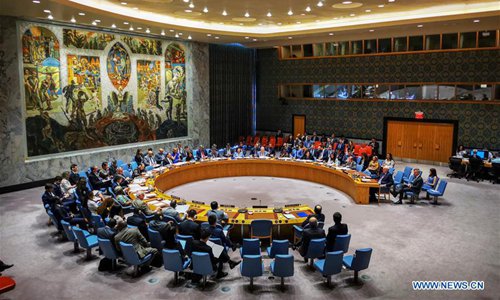HOME >> WORLD
Six European countries join barter system for Iran trade
Source:AFP Published: 2019/12/1 20:13:40
Paris, London and Berlin on Saturday welcomed six new European countries to the INSTEX barter mechanism, which is designed to circumvent US sanctions against trade with Iran by avoiding use of the dollar.

The Paris-based INSTEX functions as a clearing house allowing Iran to continue to sell oil and import other products or services in exchange.
The system has not yet enabled any transactions.
Washington in 2018 unilaterally withdrew from the international agreement governing Iran's nuclear program and reinstated heavy sanctions against Tehran.
The accession of the six new members "further strengthens INSTEX and demonstrates European efforts to facilitate legitimate trade between Europe and Iran," France, Germany and Britain said.
It represents "a clear expression of our continuing commitment to the Joint Comprehensive Plan of Action" - the 2015 Iranian nuclear deal - the trio added.
They insisted Iran must return to full compliance with its commitments under the deal "without delay."
"We remain fully committed to pursuing our efforts towards a diplomatic resolution within the framework of the JCPoA."
The 2015 deal set out the terms under which Iran would restrict its nuclear program to civilian use in exchange for the lifting of Western sanctions.
Since the US pullout, Iran has taken four steps back from the accord.
The latest was on November 4 when its engineers began feeding uranium hexafluoride gas into mothballed enrichment centrifuges at the underground Fordow plant south of Tehran.
Newspaper headline: Barter salvages JCPOA

Photo taken on June 26, 2019 shows the United Nations Security Council's semi-annual briefing on the implementation of Resolution 2231, which endorsed the Joint Comprehensive Plan of Action (JCPOA) on Iran's nuclear program, at the UN headquarters in New York. Joao Vale de Almeida, head of the EU delegation to the United Nations, on Wednesday reiterated support for the Joint Comprehensive Plan of Action, commonly known as the Iran nuclear deal, despite mounting tensions between the United States and the Islamic republic. (Photo: Xinhua)
"As founding shareholders of the Instrument in Support of Trade Exchanges [INSTEX], France, Germany and the United Kingdom warmly welcome the decision taken by the governments of Belgium, Denmark, Finland, the Netherlands, Norway and Sweden, to join INSTEX as shareholders," the three said in a joint statement.The Paris-based INSTEX functions as a clearing house allowing Iran to continue to sell oil and import other products or services in exchange.
The system has not yet enabled any transactions.
Washington in 2018 unilaterally withdrew from the international agreement governing Iran's nuclear program and reinstated heavy sanctions against Tehran.
The accession of the six new members "further strengthens INSTEX and demonstrates European efforts to facilitate legitimate trade between Europe and Iran," France, Germany and Britain said.
It represents "a clear expression of our continuing commitment to the Joint Comprehensive Plan of Action" - the 2015 Iranian nuclear deal - the trio added.
They insisted Iran must return to full compliance with its commitments under the deal "without delay."
"We remain fully committed to pursuing our efforts towards a diplomatic resolution within the framework of the JCPoA."
The 2015 deal set out the terms under which Iran would restrict its nuclear program to civilian use in exchange for the lifting of Western sanctions.
Since the US pullout, Iran has taken four steps back from the accord.
The latest was on November 4 when its engineers began feeding uranium hexafluoride gas into mothballed enrichment centrifuges at the underground Fordow plant south of Tehran.
Newspaper headline: Barter salvages JCPOA
Posted in: EUROPE